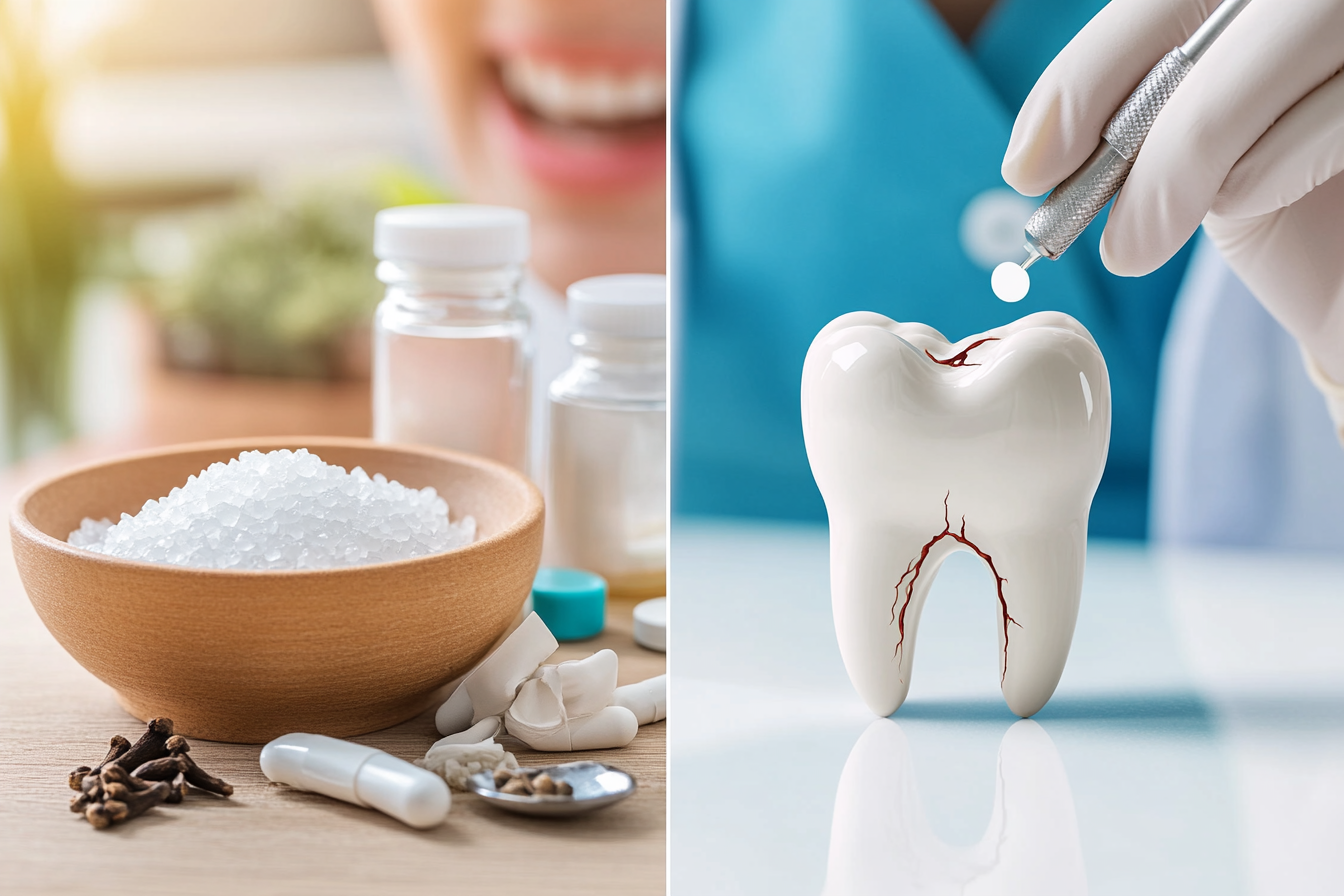Discover natural remedies for temporary relief from a cracked tooth and essential information on causes, symptoms, and professional treatments.
- Seek professional dental care immediately for proper treatment of a cracked tooth.
- Natural remedies can provide temporary relief but are not substitutes for dental treatment.
- Saltwater rinses, clove oil, and OTC pain relievers may help manage pain and inflammation.
- Avoid hard foods and extreme temperature changes to prevent further damage.
- Wear mouthguards and maintain good oral hygiene to prevent cracked teeth.
- Natural remedies should be used in conjunction with, not in place of, professional dental care.
Cracked Tooth Care Tips
Seek Professional Care
Seek professional dental care immediately for proper treatment of a cracked tooth.
Use Natural Remedies
Natural remedies can provide temporary relief but are not substitutes for dental treatment.
Saltwater Rinse
Rinse with saltwater to reduce inflammation and promote healing.
Clove Oil
Apply clove oil for its pain-relieving and anti-inflammatory properties.
OTC Pain Relievers
Use over-the-counter pain relievers to manage pain and reduce inflammation.
Cold Compress
Apply a cold compress to the outside of your mouth to reduce swelling.
Remember:
These tips are temporary solutions. Consult a dentist as soon as possible.
Introduction
A cracked tooth is a painful dental concern that requires prompt attention. While professional treatment is crucial for proper care, natural remedies can offer temporary relief and help manage symptoms. In this comprehensive guide, we’ll explore the causes, symptoms, home treatments, and prevention strategies for cracked teeth, focusing on how to fix a broken tooth naturally.

Understanding Cracked Teeth
What is a Cracked Tooth?
A cracked tooth occurs when a fracture develops in the tooth structure. These can range from minor surface-level cracks in the enamel to more severe splits extending into the root. Cracked tooth syndrome (CTS) is an incomplete fracture of a vital posterior tooth that may involve the dentin and occasionally extend to the pulp.

Causes of Cracked Teeth
Understanding the causes of cracked teeth can help you prevent future occurrences. Here are some common causes:

- Biting down on complex objects or food
- Teeth grinding (bruxism)
- Large existing fillings that weaken tooth structure
- Sudden temperature changes in the mouth
- Physical trauma or injury
- Age-related wear and tear
Cracked Tooth Symptoms
It is crucial to recognize the symptoms of a cracked tooth for early intervention. Keep an eye out for:
- Pain when chewing or biting
- Warm, chilled, or sugary foods and beverages may trigger sensitivity.
- Intermittent pain that comes and goes
- Swelling around the affected tooth
- Difficulty pinpointing the exact source of pain

Natural Remedies for Temporary Relief
While professional dental care is essential, these natural remedies can temporarily relieve a cracked tooth. Remember, these methods are not substitutes for proper treatment but can help manage discomfort while you await professional care.

1. Saltwater Rinse
Rinsing with saltwater can reduce inflammation and help healing.
How to use: Mix some salt in warm water.
rinse it in your mouth for half a minute and Spit it out
Repeat 2-3 times daily
Benefits: Saltwater rinses can help reduce inflammation, cleanse the area, and promote healing.
More:-
- How Much Does It Cost to Bond Teeth?
- How to Sleep After Wisdom Teeth Removal
- How to Tighten a Loose Tooth at Home
2. Clove Oil
Clove oil has been utilized for centuries to relieve tooth discomfort because of its natural pain-relieving and anti-inflammatory qualities.
How to use: Apply the affected area with a cotton swab coated with 2-3 drops of clove oil.
Alternatively, chew on a whole clove near the cracked tooth
Benefits: Clove oil contains eugenol, which has natural analgesic and anti-inflammatory properties.
3. Over-the-Counter Pain Relievers
Grab some painkillers to help with the pain and swelling from a cracked tooth.
How to use: Take ibuprofen, acetaminophen, or aspirin as directed on the packaging.
Benefits: These medications can help manage pain and reduce inflammation associated with a cracked tooth.
4. Cold Compress
A cold pack can help numb the area and bring down the swelling.
How to use: Wrap an ice pack in a towel
Put it on your cheek near the sore tooth for 15 minutes.
Benefits: Cold compresses can numb the area and reduce swelling.
5. Dental Wax
Dental wax can protect the surrounding soft tissues from irritation caused by the cracked tooth.
How to use: Apply a small amount of over-the-counter dental wax to cover any sharp edges of the cracked tooth.
Benefits: Dental wax stops irritation to your gums.
6. Dietary Adjustments
Avoiding certain foods can help prevent additional pain and protect the cracked tooth from further injury.
Steer clear of:
Hard foods (e.g., nuts, hard candy)
Chewy foods (e.g., caramel, tough meats)
Extremely hot or cold foods and drinks
Benefits: Avoiding these foods can help prevent additional pain and protect the cracked tooth from injury.
Comparison of Natural Remedies
Here’s a quick comparison of the natural remedies discussed:
| Remedy | Ease of Use | Pain Relief | Anti-inflammatory | Protection |
|---|---|---|---|---|
| Saltwater Rinse | High | Moderate | High | Low |
| Clove Oil | Medium | High | High | Low |
| OTC Pain Relievers | High | High | High | None |
| Cold Compress | High | Moderate | High | None |
| Dental Wax | Medium | Low | None | High |
| Dietary Adjustments | Medium | Moderate | None | High |
Professional Treatment Options

Natural remedies might help a little while, but you must see a dentist to fix a cracked tooth. Depending on the severity and location of the crack, a dentist may recommend one of the following treatments:
- Bonding: For small cracks, a dentist might use a special kind of plastic to fix the crack and make the tooth look and work like it did before.
- Crowns: For more extensive cracks, a crown may be placed over the entire tooth to protect and prevent the crack from worsening.
- Root Canal: If a crack reaches the tooth’s pulp, a root canal might be needed to save it.
- Extraction: Removing the tooth might be the only choice if the tooth can’t be saved.
Preventing Cracked Teeth

It’s always wiser to stop something terrible from happening than to fix it afterwards. While we can’t prevent every crack from forming, here are some ways you can reduce the likelihood of it happening:
- Wear a mouthguard: Don’t forget to wear one during sports or if you grind your teeth.
- Avoid chewing complex objects: Avoid ice, popcorn kernels, or pen caps.
- Teeth as a tool: Never use your teeth as bottle openers or for any such task.
- Practice good oral hygiene: Keep your teeth strong and healthy by brushing and flossing correctly.
- Regular check-ups: See your dentist regularly for check-ups and cleanings.
- Address teeth grinding: Consult your dentist about any teeth grinding or clenching habits.
More:-
- How to Get Food Out of Wisdom Tooth Hole
- How to Speed up Wisdom Teeth Recovery
- How to Relieve Pain from Dental Implant
Oral Hygiene Routine for Preventing Cracked Teeth
To maintain strong, healthy teeth and prevent cracks, follow this oral hygiene routine:

Brush Teeth Twice Daily
Use Fluoride Toothpaste
Floss Daily
Use Mouthwash
Avoid Sugary Foods & Drinks
Regular Dental Check-Ups
When to Seek Professional Help

If you suspect a cracked tooth, seek professional dental care promptly. Natural remedies only provide temporary relief. Treatment can stop a cracked tooth from worsening and might even save the tooth.
Contact your dentist immediately if you experience:
- Persistent pain or sensitivity
- Visible cracks or chips in your tooth
- Swelling or bleeding around the affected tooth
- Difficulty chewing or biting
The Importance of Professional Dental Care
It’s important to know that while natural remedies can temporarily relieve, they can’t replace professional dental care. Here’s why getting professional help matters:
- Accurate Diagnosis: Dentists have the tools and expertise to diagnose the extent and severity of the crack properly.
- Prevent Further Damage: Professional treatment can stop the crack from worsening and potentially save the tooth from extraction.
- Address Underlying Issues: A cracked tooth may be a symptom of other dental problems that need attention.
- Long-term Solutions: Professional treatments provide long-lasting or permanent solutions, unlike temporary relief from natural remedies.
- Prevent Complications: Untreated cracked teeth can lead to infections, abscesses, or more severe dental issues.
Conclusion
Home remedies like salt water rinses, clove oil, and over-the-counter pain relievers can temporarily help toothaches if you have a cracked tooth. However, seeking professional dental care for long-term relief and addressing any underlying issues is essential. These home treatments can help manage pain and inflammation while you await professional treatment.
Never forget to take care of your teeth, wear a mouthguard while playing sports, be careful with hard foods, and keep your teeth clean. These straightforward strategies can minimize the risk of a cracked tooth. If you suspect you have a cracked tooth, don’t hesitate to contact your dentist immediately.
“Ensuring good oral health is crucial for your overall well-being.” By combining natural remedies for temporary relief with professional dental care, you can effectively manage a cracked tooth and maintain optimal dental health. Early intervention helps save your smile and avoid serious issues: Catching problems early prevents more significant issues later.
Keep taking an active approach to maintaining good dental health while learning how to fix a cracked tooth naturally, which can provide temporary relief. Professional dental care is always the best course of action for long-term oral health.



